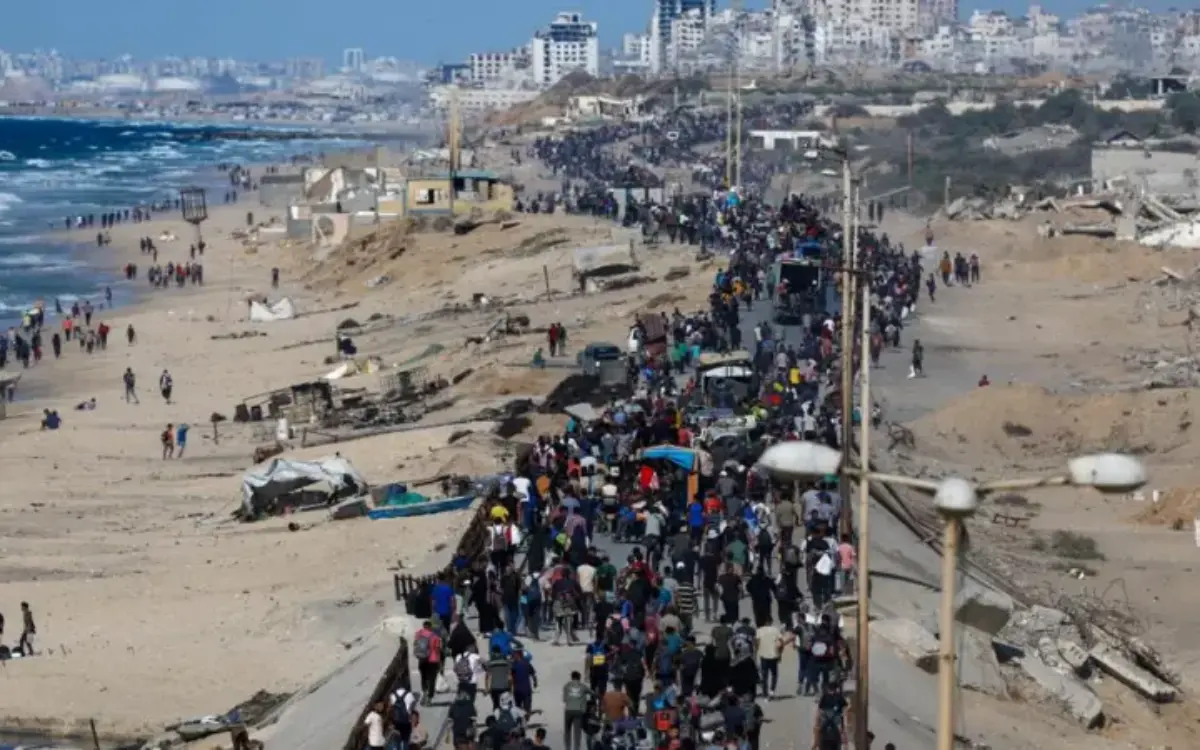Jerusalem (Parliament Politics Magazine) – About 200,000 Palestinians have gone back to northern Gaza after a ceasefire, as Israeli troops pull back and leaders get ready to sign a peace deal in Egypt.
Sky News reports that thousands of Palestinians began returning to northern Gaza after Israel confirmed a ceasefire, raising hopes the two-year war could end.
Israel and Hamas reached a ceasefire deal on 10 October, which the military confirmed came into effect within a few hours.
Palestinians returned north after the Gaza ceasefire
Hamas’s civil defence reports that around 200,000 people have returned to northern Gaza since the ceasefire took effect.
Under the agreement, Israeli troops pulled back, and Hamas plans to release 20 surviving and 28 deceased Israeli hostages on Monday.
Israel plans to free 250 Palestinian prisoners serving life sentences and 1,700 Gazans detained since the October 7 attacks.
Hamas’ views on Donald Trump’s role in the Gaza ceasefire
A Hamas official said the group may allow the Palestinian Authority to rule in Gaza but plans to maintain a presence on the ground.
Dr Basem Naim said the ceasefire agreement would not have been possible without US President Donald Trump’s personal involvement.
He stated,
“Therefore, yes, we thank President Trump and his personal efforts to interfere and to pressure [Benjamin] Netanyahu to bring an end to this massacre and slaughtering.”
Mr Naim added,
“We believe and we hope that President Trump will continue to interfere personally and to exercise the maximum pressure on Netanyahu to fulfil the obligation.”
He confirmed former UK Prime Minister Sir Tony Blair, who was set to join an international supervisory body under Trump’s plan, would not be welcomed.
Dr. Naim said Palestinians hold “very bad memories” of the ex-British prime minister.
How did Trump’s intervention help convince Hamas to release hostages?
Reuters reports that a single extraordinary phone call last month played a crucial role in Hamas agreeing to release its remaining Israeli hostages.
During the call, President Trump connected Israeli Prime Minister Benjamin Netanyahu after a White House meeting in September to apologise to Qatar’s prime minister for an Israeli strike on a Hamas-run residential building in Doha.
According to two officials, Trump’s handling of the Qatar strike, which failed to kill Hamas leaders like Khalil al Hayya, gave the group confidence in his ability to challenge Mr Netanyahu and end the Gaza war.
Mr Trump announced he will visit Israel on Monday and address the Knesset, Israel’s parliament.
He will then travel to Egypt to host a summit of world leaders on Gaza, with guarantors taking part in a signing ceremony on Monday or Tuesday.
Donald Trump’s stance on Gaza and a Palestinian state
The US president said disarmament would come in the second phase of the Gaza agreement, with Israel insisting Hamas surrender its weapons.
When asked about a two-state solution, he gave no firm stance, stating he would follow whatever is agreed. “I don’t have a view. I’ll go with what they decided,” he said.
Mr Trump stated,
“We’re going to see how it all goes. There’s a point at which we may do something that would be a little bit different, and maybe very positive for everybody. We’ll be looking at that at the time. I think we will get there.”
Regarding Palestinians, he added,
“We’re going to create something where people can live … We’re going to create better conditions for people.”
United Nations plan for humanitarian aid in Gaza
The United Nations aims to increase humanitarian supplies to Gaza during the first 60 days of the ceasefire.
Tom Fletcher, the under-secretary-general for humanitarian affairs and emergency relief coordinator, stated,
“We will aim to increase the pipeline of supplies to hundreds of trucks every day. We will scale up the provision of food across Gaza to reach 2.1 million people who need food aid and around 500,000 people who need nutrition.”
He added, “Famine must be reverted in areas where it has taken hold and prevented in others.”
Netanyahu’s spokesperson’s views on his war goals
Benjamin Netanyahu’s office confirmed that the prime minister’s three key war aims have now been accomplished.
Shosh Bedrosian, the prime minister’s office spokesperson, stated,
“We have hit a critical point in this war. From day one in this war, the prime minister laid out three objectives – the return of all of our hostages, the defeat and dismantling of Hamas and ensuring Gaza no longer poses a threat to Israel.”
She added,
“All of the prime minister’s objectives have now been achieved.”
Key facts about the Israel-Hamas conflict
The Israel-Hamas conflict began on October 7, 2023, when Hamas launched a surprise attack on Israel, killing about 1,200 people and taking over 240 hostages.
The war caused severe suffering in Gaza, with over 65,000 Gazans killed and widespread destruction of homes and infrastructure, leaving millions displaced and facing a humanitarian crisis.


